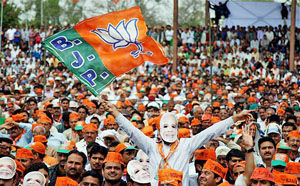Ranchi/New Delhi, Dec 23: The BJP Tuesday said it was ready to form a stable government in Jharkhand, with party president Amit Shah crediting the election victory to Prime Minister Narendra Modi.
"It is for the first time that people of Jharkhand have given a clear mandate in an assembly election to the BJP," Shah told journalists in New Delhi. "We will form a majority government."
Shah said his party was poised to win 41 seats in the 81-member assembly. Its ally, the All Jharkhand Students Union (AJSU), won four seats.
He credited the victory in Jharkhand -- and the BJP's good showing in Jammu and Kashmir -- to the achievements of Modi's six-month-old central government.
"People's love and respect for Modi has translated into this victory (in Jharkhand)," Shah said, referring to a state that has seen a as many as nine chief ministers in the past 14 years.
Earlier, state BJP president Ravindra Kumar Rai told media persons: "We will form a stable government in Jharkhand.
"We were hoping to get a two-third majority but have fallen short of the 50 seats we were hoping to win," he said.
Vote count that began in the morning showed that the BJP was coasting to victory. It could get around 40 seats, more than the 18 it held in the outgoing assembly.
Modi had addressed a number of rallies in the state in the run up to the five-phase polls.
"Forming government in Jharkhand is imminent," said Defence Minister Manohar Parrikar outside parliament in New Delhi.
The ruling Jharkhand Mukti Morcha (JMM) seemed set to improve its performance, bagging around 20 seats. It was an improvement from 18 seats that it won last time, but woefully short of the halfway mark.
The JVM was headed for victory on eight seats while the Congress was set to get four seats.
Almost all the exit polls after the five-phase election had predicted a BJP win in Jharkhand.
It was a day of big upsets, with even former chief ministers biting the dust.
Chief Minister Hemant Soren contested from two seats. He won from Barhait but was trailing in Dumka.
Former chief minister Madhu Koda, accused of corruption, lost the poll from Majhgao assembly seat.
Another former chief Minister, Babulal Marandi, was trailing in Dhanwar. Arjun Munda, also a former chief minister, trailed from Kharsawa seat.
The BJP, which contested the polls in alliance with the AJSU and the Lok Janshakti Party (LJP), fielded candidates in 72 seats. The AJSU had put up candidates in eight places. The LJP had one candidate.
The Congress contested 60 seats while its allies RJD fielded 19 candidates. The CPI and CPI-M fielded candidates respectively in 24 and 13 constituencies.





Comments
Add new comment